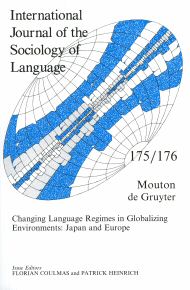International Journal of the Sociology of Language 175/176. Changing Language Regimes in Globalizing Environments: Japan and Europe

What are the consequences and concomitants of globalization in the field of language? Answers to this question vary with the languages and the research domains in question. The vantage point of this special issue is the concept of language regimes, loosely defined as sets of habits and attitudes, legal provisions, and ideologies. Japan is at the centre of the discussion, providing as it does a case where the effects of intensifying global interdependence are strongly felt.<BR>Ever since Japan embarked on a course of rapid modernization in the final decades of the nineteenth century, its government has operated under monolingual assumptions and made great efforts to install a monolingual language regime stressing homogeneity and a uniform standard. In our days, both the language regime that has been in place through the better part of the twentieth century and the underlying assumptions are being undercut by developments originating outside, and having repercussions beyond, Japan’s borders. Among the many aspects of Japan’s language regime, which was functionally well-suited for modem industrial society and a catching-up economy, but which is loosing its relevance in the emerging postmodern knowledge society, are the presumed identity of state, people and language; the exclusive status and the comprehensive functional range of the national language; the linguistic standard of right and false keyed to an ideal written norm; and the assumption of discrete language systems.
The articles in this special issue show that as Japan is getting to terms with growing internal linguistic diversity and with the need for more extensive communication across national borders, language services, language policies, language-related industries, and language preferences are being subject to adjustment – some in a piecemeal fashion, some more abruptly. Similar changes have been going on for decades elsewhere, especially in Western Europe, which therefore and despite many obvious differences serves as a useful plane of reference for many comparisons.
Globalization has many faces, and changes of language regimes induced by it will continue warranting observation and analysis. The International Journal of the Sociology of Language is an obvious place to do this. With the present double issue we hope to shed some light on relevant issues and stimulate further discussion. The seed conference took place on three sunny days in the spring of 2004 at Duisburg-Essen University. It was generously supported by a grant from Stiftung Volkswagenwerk which is gratefully acknowledged.
Content
Preface
pp. 1-2
Japanese language policy from the point of viev of public philosophy
pp. 41-54
Labor migration and the language barrier in contemporary Japan: the formation of a domestic language regime of a globalizing state
pp. 55-82
Metroethnicity, language, and the principle of Cool
pp. 83-102
Politics, the media, and Korean language acquisition in Japan
pp. 123-156
Econolinguistic aspects of multilingual signs in Japan
pp. 157-178
Japan as a host country: attitudes toward migrants
pp. 179-192
Regional dialect and cultural development in Japan and Europe
pp. 193-212
Language ideology in JFL textbooks
pp. 213-232
Beyond keigo: smooth communication and the expression of respect in Japanese as a Foreign Language
pp. 233-248
Learning to read and write in Japanese (kokugo and nihongo): a barrier to multilingualism?
pp. 249-270
Japanese language instruction and the question of "correctness"
pp. 271-284
Interactional expectations and lingusitic knowledge in academic expert discourse (Japanese/German)
pp. 285-306
Foreigners and the Japanese in contact situations: evaluation of norm deviations
pp. 307-323
Changing language regimes in globalizing environments
pp. 3-16
Sociolinguistic perspectives on emerging multilingualism in urban Europe
pp. 17-40
Signs of multilingualism in Tokyo. A diachronic look at the linguistic landscape
pp. 103-121